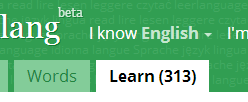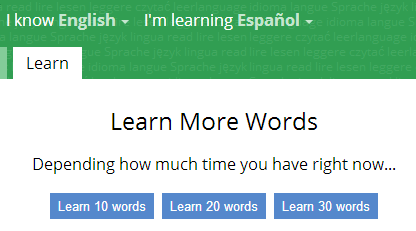The best way to read in the language you're learning
Spaced Repetition, Version 2
August 9, 2013I’ve recently updated the way Readlang’s SRS (Spaced Repetition System) works. If you haven’t heard of SRS, I recommend reading this Wired article about SuperMemo creator Piotr Wozniak.
The Past
This is how Readlang used to work:
-
All words initially go to the “Not Started” group.
-
Words move into the SRS until your daily average schedule reaches your target (30 by default), and then you wait until tomorrow. More useful (higher frequency) words are moved first.
-
New words only move into the SRS when there’s room in your schedule.
This approach works fine if you want to do exactly the same number of flashcards, every single day. If you neglect them for a few days two bad things happen:
-
A backlog of scheduled words accumulates, so that when you return to Readlang you have an intimidating number of words to get through.

-
No new words will enter the system until you’ve worked through your backlog.
And if you go crazy and one day decide to increase your limit and pump lots of new words into the system, you’ve just guaranteed an unmanageable work load for the next couple of weeks. Think about what this does for motivation, instead of getting rewarded for learning more you get punished.
How important is that number of “Scheduled for today” words anyway? After all the distiction between “Scheduled for today” words and “Not Started” words is artificial, they are all words that you want to learn, so if you have entered 2382 words into the system it may as well say “Learn (2382)”, which is ridiculous. The number only serves to guilt you into doing your flashcards.
This is a common problem with SRS systems, and it can lead to disillusionment. It’s still a great method and if each word was equally important, then clearing your backlog first makes sense, but every word is not equally useful and so I think there’s a better way.
The Present
The new system is designed to fix these problems:
-
You can choose to do a small set of 10, 20 or 30 flashcards as many times as you like per day. The system doesn’t even tell you how many cards are scheduled for today, because I don’t think it’s important or useful. This puts you in control. Study as much, or as little, as you like.
-
The flashcards shown to you are the most useful (highest frequency) 10, 20 or 30 words from your entire collection of “Not Started” plus “Scheduled for today” cards. Usefulness here means word frequency, and can be overridden by starring words to favorite them.

Conculsion
The underlying SRS is still the same, but now it now:
- more strongly prioritises useful (high frequency) words
- splits studying into managable chunks
- allows you to study as much or as little as you like
I hope you enjoy it!
PS. I'm currently working on an open API to allow others to create apps and games using your words in Readlang, stay tuned!
Tweet comments powered by Disqus